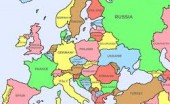Molly Minturn - My family is heartbroken to share that my father died in surgery on Monday, Feb. 10. It…
Wednesday Night #948 – Three ambassadors
Written by Diana Thebaud Nicholson // May 3, 2000 // Herb Bercovitz, Kimon Valskakis, Misha Crnobrnja, Reports, Wednesday Nights // Comments Off on Wednesday Night #948 – Three ambassadors
See more on Wednesday-Night.com
Introductions
Among the several new faces around the room were those of two fellow Latin American students and friends of René Armas, Javier Rattia and Jonathan Rosemberg, respectively studying International Business at Concordia and Political Science at McGill. Both are deeply interested in international affairs and anxious to expand their theoretical knowledge with the practical experiences of Wednesday Night guests.
Holly Jonas – who is gradually bringing her family into the Wednesday Night circle – introduced her elder son, Jeremy, recently of McKinsey and newly of Peachtree, the on-line grocery service written up in the Gazette.
Last, but certainly not least, returning after several years’ absence, Wednesday Night’s almost-new-neighbor, Cornelia Nihon, currently serving as Foreperson-Boss-Lady of the construction site on Rosemount Avenue.
David Berger, former Canadian Ambassador to Israel and, previously, Westmount’s Member of Parliament, was welcomed back to Wednesday Night.
The Shimon Peres Institute for Peace
Frequently, the topic advertised in the Wednesday Night invitation is not the only one discussed and Wednesday May 3 was no exception.
David Berger spoke about his commitment to the Shimon Peres Institute for Peace and the establishment of the Canadian Friends of the Institute to help further its projects, particularly among the young people of Israel and Palestine. Mr. Peres is to be in Montreal over the weekend and David is holding a reception at the Bonaventure Hilton to give a representative group of Montrealers the opportunity to hear about the Institute directly from the Nobel Laureate and founder. David “tabled” documentation on the Institute’s mission and projects; anyone who is interested may contact David Berger directly.
Global Governance
The treaty of Westphalia, signed on October 24, 1648, radically changed the concepts of national boundaries and sovereignty in the western world, ending thirty years of combat and upheaval. In so doing, it essentially eradicated the Holy Roman Emperor as a secular ruler in all but a limited territory, establishing Switzerland and the Netherlands as independent states, filling the void left by the HRE with the Hapsburgs. The three and a half subsequent centuries have seen consolidation of the concept of government by the state, but recent changes have clearly demonstrated that Democracy lags behind Westphalia and Westphalia II must be written.
The issue is globalization. It has become evident that, due to equal weighting of member states, the United Nations, while playing an effective, even essential role in many areas, is incapable of dealing with the world’s tribal conflicts that occupy the conscience of the World. With increasing globalization in the realm of Communications and Commerce, the agenda is being driven more by the electronic media, Internet and Transnational Corporations. Meanwhile tribal and religious conflicts continue.
It is clear that because of this situation, the United Nations has been unable to intervene in Kosovo. Intervention by NATO, and more particularly the United States, was clearly illegal under international game rules respecting sovereignty. The campaign was poorly thought out. The Americans, because of their obsession over losing American soldiers in foreign wars made three fundamental errors, namely their alignment with radical Albanian Kosovars, their reluctance to use ground troops and the bombing, which consolidated support for Milosevic [bio] even from his political opponents. In the end, the war stopped when the Russians threatened to discontinue supplying fuel oil to Serbia. The problem, more complex than that in Cyprus, will probably persist as long.
Africa
With CBS and CNN focussing the world’s attention on a small band of international players whose interests and actions are inimical to those of the United States, the real tribal problems, genocide and starvation in Africa for example, are totally ignored.
National economies no longer exist in isolation or as part of colonial trade empires. The interdependence of nations and their economies requires global competition laws. Without global rule of law, “market systems become mafia systems”. The obvious solution appears to be a new all-inclusive global government, created not on the United Nations model, but on the European model. The alternative is continuing conflict, chaos and human suffering in every part of the world, as we are seeing now in Zimbabwe, Sierra Leone, Chechnya, Ethiopia, East Timor….
From the Club of Rome, to the Club of Athens, international diplomats, statesmen, thinkers have actively sought a solution, a workable Global Governance model which can be accepted by nationalists and special interest groups as a benign and necessary alternative to the failing theories of democracy and republicanism.
THE ECONOMY
The real economy continues to forge ahead. The North American continent is doing extremely well. The projection is for a four percent increase in GDP in real terms this year. The American economy increased by 5½ % for the first quarter following a 7% increase in the last quarter of 1999. Canada’s trade surplus is in the order of four and a half billion dollars each month.
In February, the Canadian economy experienced its first broad-based decline in nineteen months. Productivity is running slightly over one-third that of the United States. Unemployment is at six percent versus that of the United States at four percent. Inflation has begun to rise because of energy prices (3% in Canada, 3.7% in the United States). A quarter to half percent interest rate increase is expected in the United States on May 16, followed by an additional quarter percent in August and again in December. Canada will increase rates in May by a 1/4 %. The Stock Market will be bumpy, but both will rise, with the TSE outperforming the Dow and the Nasdaq remaining under pressure. The Canadian dollar is weaker because it is expected that we will not fully match the American interest rate increases.
QUOTES OF THE EVENING
“The whole concept of the nation as the building block is antiquated.”
“The financial economy seems to have a life of its own.”
“(Alan) Greenspan influences investors. Investors try to outguess fellow investors.”
“We are rewriting Economics now because of high technology and the Internet.”
ANOTHER VIEW OF THE DISCUSSION
I enjoyed the evening, especially the insights into the ordinary life of the OECD – a round of cocktails and seminars- and the difficulties of making any significant changes to the community, given the one nation/one vote/one veto principle.
How does one assign relative voting rights/veto rights? I know the USA in their air bilaterals makes a distinction between “who benefits More” and therefore should pay more – can one translate such commercial principles into voting rights in terms of who represents more – more wealth, more people, more criticality?
Surely Global Governance demands going beyond the dominant 5 or 7 or 21 and shifting location,perspective and eventually direction.
And this from a missing airline representative:
Sorry I’m going to miss you tonight especially with the hot topics of our financials and the government testimony going on (including the fanciful allegations of oneworld partners — they did have the opportunity to aid Canadian just as Lufthansa and United aided us). I’ll try to get back to you in the next couple weeks.
Meanwhile, it’s interesting to discover that the politicians, diplomats and international civil servants are trying to find solutions quite in the same human way as we airline people try to maximize revenues, understanding the psychology of our clients and taking on certain positions and postures.
Notes by Herb Bercovitz Sculptor
P R O L O G U E
Last week’s wonderfully focused discussion of “Genomania” is surely a hard act to follow. However, this Wednesday, May 3rd, we will make an attempt. Kimon Valaskakis, former Canadian Ambassador to the OECD, well known author, economist, sometime political candidate and otherwise all-round under-achiever, has suggested the topic of Global Governance
As some of you will remember, the subject was briefly touched upon last Fall prior to the World Civil Society Conference in Montreal, but Wednesday-Night has never explored it thoroughly, so we are delighted to do so with Kimon’s guidance.No doubt there will be some discussion of the up-coming PQ meeting and what may be expected from that, as well as the sudden largesse showered on Montreal by Québec.
A couple of important culture notices: Harry Mayerovitch is being honoured with another show, this time at the Maison de la culture de Côte des Neiges, starting this Thursday. On Saturday, May 13th, the Premiere of “Canadian Mosaic” will be held at Pollack Hall at 7:30 p.m. Don Patriquin wrote this for the 20th anniversary of the PSBGM and it is to be performed by three choirs. Tickets are a reasonable $7- $15.


